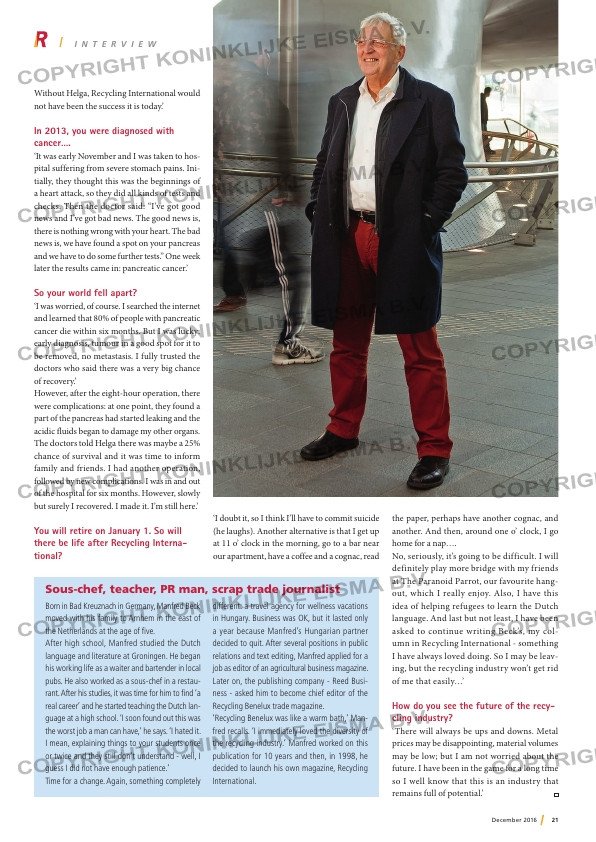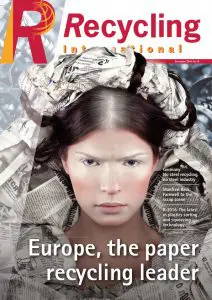Page 21 from: December 2016

I N T E R V I E W
21December 2016
Without Helga, Recycling International would
not have been the success it is today.’
In 2013, you were diagnosed with
cancer….
‘It was early November and I was taken to hos-
pital suffering from severe stomach pains. Ini-
tially, they thought this was the beginnings of
a heart attack, so they did all kinds of tests and
checks. Then the doctor said: “I’ve got good
news and I’ve got bad news. The good news is,
there is nothing wrong with your heart. The bad
news is, we have found a spot on your pancreas
and we have to do some further tests.” One week
later the results came in: pancreatic cancer.’
So your world fell apart?
‘I was worried, of course. I searched the internet
and learned that 80% of people with pancreatic
cancer die within six months. But I was lucky:
early diagnosis, tumour in a good spot for it to
be removed, no metastasis. I fully trusted the
doctors who said there was a very big chance
of recovery.’
However, after the eight-hour operation, there
were complications: at one point, they found a
part of the pancreas had started leaking and the
acidic fluids began to damage my other organs.
The doctors told Helga there was maybe a 25%
chance of survival and it was time to inform
family and friends. I had another operation,
followed by new complications. I was in and out
of the hospital for six months. However, slowly
but surely I recovered. I made it. I’m still here.’
You will retire on January 1. So will
there be life after Recycling Interna-
tional?
‘I doubt it, so I think I’ll have to commit suicide
(he laughs). Another alternative is that I get up
at 11 o’ clock in the morning, go to a bar near
our apartment, have a coffee and a cognac, read
the paper, perhaps have another cognac, and
another. And then, around one o’ clock, I go
home for a nap….
No, seriously, it’s going to be difficult. I will
definitely play more bridge with my friends
at The Paranoid Parrot, our favourite hang-
out, which I really enjoy. Also, I have this
idea of helping refugees to learn the Dutch
language. And last but not least, I have been
asked to continue writing Beck’s, my col-
umn in Recycling International – something
I have always loved doing. So I may be leav-
ing, but the recycling industry won’t get rid
of me that easily…’
How do you see the future of the recy-
cling industry?
‘There will always be ups and downs. Metal
prices may be disappointing, material volumes
may be low; but I am not worried about the
future. I have been in the game for a long time
so I well know that this is an industry that
remains full of potential.’
Sous-chef, teacher, PR man, scrap trade journalist
Born in Bad Kreuznach in Germany, Manfred Beck
moved with his family to Arnhem in the east of
the Netherlands at the age of five.
After high school, Manfred studied the Dutch
language and literature at Groningen. He began
his working life as a waiter and bartender in local
pubs. He also worked as a sous-chef in a restau-
rant. After his studies, it was time for him to find ‘a
real career’ and he started teaching the Dutch lan-
guage at a high school. ‘I soon found out this was
the worst job a man can have,’ he says. ‘I hated it.
I mean, explaining things to your students once
or twice and they still don’t understand – well, I
guess I did not have enough patience.’
Time for a change. Again, something completely
different: a travel agency for wellness vacations
in Hungary. Business was OK, but it lasted only
a year because Manfred’s Hungarian partner
decided to quit. After several positions in public
relations and text editing, Manfred applied for a
job as editor of an agricultural business magazine.
Later on, the publishing company – Reed Busi-
ness – asked him to become chief editor of the
Recycling Benelux trade magazine.
‘Recycling Benelux was like a warm bath,’ Man-
fred recalls. ‘I immediately loved the diversity of
the recycling industry.’ Manfred worked on this
publication for 10 years and then, in 1998, he
decided to launch his own magazine, Recycling
International.



